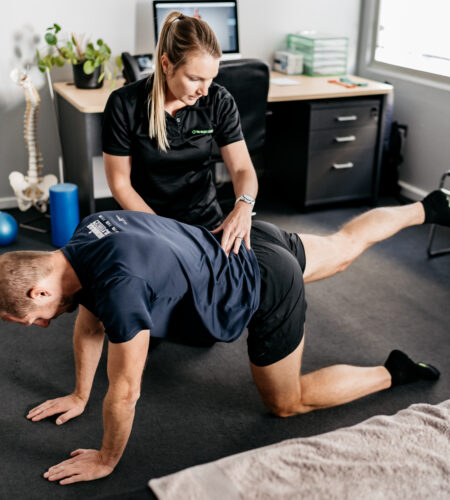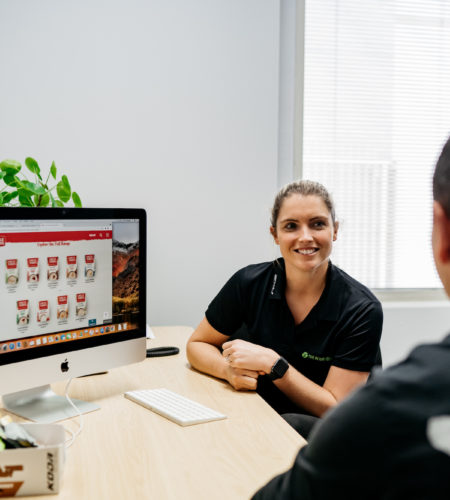
Want to learn more about low back pain?
Lachie Cooper, Physiotherapist, has answered some common questions.
Check them out below!



Can disc bulges heal?
In short, yes, many disc injuries (including disc bulges and various other types of disc injuries) can heal without surgical intervention. There are numerous studies which have demonstrated that acute disc bulges can reduce in size. This also includes disc injuries which initially cause compression of nerves as they exit the spine. There are many cases where we are able to conservatively manage disc injuries that result in nerve compression, where over time the disc injury improves and no longer causes nerve compression.
Of course, this does not apply to all disc injuries! Some cases do require surgery, particularly persistent cases or those with particular symptoms. As such, you should always get this checked by a healthcare professional as soon as possible.
I have a disc bulge in my spine on MRI, what should I do?
Disc bulges and protrusions are a surprisingly common finding on low back (lumbar) MRIs, including MRIs of the spine in individuals without symptoms. One particular study found that in asymptomatic individuals, approximately 30% of 20 years olds and 69% of 60 years olds demonstrated a lumbar disc bulge.
Of course, we need to be careful when interpreting this data. It isn’t saying that disc bulges or injuries do not cause pain, it is simply stating that these findings on MRI are not always the cause of symptoms.
As such, it is incredibly important that a healthcare professional performs an assessment of the spine to determine whether MRI findings are a likely cause of a patient’s symptoms.
What is sciatica?
Sciatica is a term which refers to pain, numbness, tingling or weakness symptoms occurring along the path of the sciatic nerve. A broader term we utilise is lumbar radiculopathy. Sciatica can result from compression of a nerve root which arises from the low back and I most commonly see patients where this is the result of an injury to an intervertebral disc or arthritic change. Keep in mind, there are many other reasons as to why this may occur.
What should I do when I aggravate my low back pain?
First things first, you should see a healthcare provider as soon as practical to determine the cause of your pain. They will be able to determine what are the appropriate steps for managing an acute flare up of your pain.
After determining what is occurring, I generally apply some basic pain management strategies. The include, however are not limited to:
- Heat packs
- Postural and positioning advice (including the use of lumbar support/pillows)
- Maintenance of movement within tolerable limits
- Gentle exercises
- Referral to a GP for pain medication
- Massage/dry needling
- Activity modification/load management
NOTE: In cases where there is urinary retention, bowel or bladder incontinence, abnormal sensation around the genitals, saddle or anus, significant weakness through a lower limb or sexual dysfunction, please present to an emergency department.
What is a pars defect? How should I manage it?
A pars defect, or spondylolysis, is essentially a fracture which occurs at a specific site of a vertebral body within the spine. Management of a pars defect depends substantially on the clinical presentation of the patient.
In some cases, patients may have an x-ray, CT or MRI demonstrating a pars defect, however their symptoms and onset of pain are not consistent with this finding. There are many individuals with asymptomatic pars defects, and as such, we need to look at other causes of their symptoms.
A symptomatic pars defect is typically found in a young and active patient. These injuries are essentially a stress fracture of the spine and need to be treated with a period of activity modification or rest followed by a structured rehabilitation plan.
Schedule your next visit
If you’re interested in booking an appointment with one of our team members, contact our clinic today and we’ll be happy to find time for a consultation.
Schedule ConsultExplore our physiotherapy services
Musculoskeletal
Physiotherapy
At The Injury Clinic Physiotherapy, we work closely with our clients to get them back doing the things they love as soon as possible.
Sports
Physiotherapy
The Injury Clinic Physiotherapy works with recreational to elite athletes to keep them injury free and achieving their goals.
Dry
Needling
All physiotherapists at The Injury Clinic Physiotherapy are qualified and experienced in dry needling as a treatment technique.
Running Related Injuries
Physiotherapists at The Injury Clinic Physiotherapy have a special interest in the diagnosis and management of running-related injuries.
Women's Health
Physiotherapy
We have physiotherapists with a special interest in Women's Health, including pre and post partum presentations. Let us work with you to stay fit, active and healthy.
Pre & Post-Operative
Physiotherapy
Physiotherapists at The Injury Clinic Physiotherapy work closely with surgeons to ensure best outcomes post surgery.
Injury Q&A
Our clinicians have been answering all your questions!
Running Analysis
The goal of a running analysis is to identify aspects of your technique that may be contributing to injury or impacting on efficiency.






Schedule your next visit
If you’re interested in booking an appointment with one of our team members, contact our clinic today and we’ll be happy to find time for a consultation.
Schedule Consult